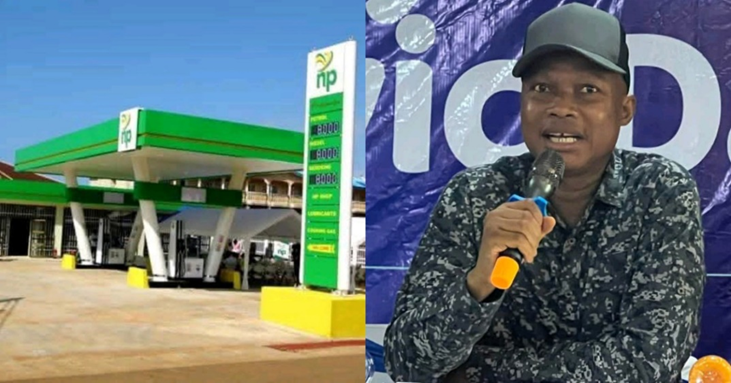By Mackie M. Jalloh
The Sierra Leone Road Safety Authority (SLRSA) has embarked on a transformative drive to modernize road safety management and driver licensing systems across Sierra Leone. The initiative, led by the Authority’s Executive Director, Mr. James Bagie Bio, reflects a new era of reform aimed at decentralizing services, enhancing public safety, and improving service delivery nationwide.
Speaking on the AM Live morning program, the Authority’s Public Relations Officer, Hassan Nelson Barrie, highlighted that the SLRSA—originally established under the 1996 Road Transport Act as the Sierra Leone Road Transport Authority—has evolved significantly over the years. It is now one of the most dynamic government agencies, tasked with enforcing road safety regulations, managing transport operations, and ensuring compliance with national transport policies.
Barrie explained that since Mr. Bio’s appointment in April 2025, the SLRSA has undergone major administrative and operational reforms that are reshaping the institution’s image. These reforms, he said, are centered around accessibility, accountability, and digital transformation.
“Under the leadership of Mr. James Bagie Bio, we have expanded our operational reach by opening new offices in key regional locations and bringing essential services closer to citizens,” Barrie said. “Communities such as Mile 91 now have direct access to motor vehicle licensing, registration, and inspection services—something that was never possible before.”
This decentralization, according to Barrie, has reduced travel costs and waiting times for citizens while boosting revenue collection for the government. The Authority has also introduced Saturday operations to increase service availability for people with busy weekday schedules.
One of the landmark achievements under the new leadership is the implementation of a secure and automated licensing system that virtually eliminates duplication and counterfeiting. The SLRSA’s new digital platform now integrates vehicle registration, driver licensing, and biometric verification to ensure authenticity and transparency.
Barrie emphasized that this system, combined with mobile licensing vehicles and digital payment mechanisms, allows citizens to obtain authentic licenses in real-time.
“For the first time, drivers can receive verifiable licenses instantly, thanks to the use of mobile units and digital infrastructure,” he stated. “We are making road safety administration not only efficient but also trustworthy.”
The Authority has also prioritized staff welfare and professional standards. Under Bio’s direction, staff are now provided with uniforms to promote corporate identity and accountability. Performance-based incentives have been introduced to motivate productivity, while regular training programs are equipping employees with the skills needed to manage modern road safety operations.
Beyond licensing and service delivery, the SLRSA has intensified its focus on road safety awareness and emergency preparedness. Barrie disclosed that the Authority is currently in advanced discussions with the National Emergency Medical Services (NEMS) to establish a formal partnership. This collaboration aims to deploy ambulances and trained first responders along high-risk road corridors to provide immediate medical assistance to accident victims.
“We want to save lives, not just regulate transport,” Barrie said. “Our goal is to ensure that when accidents happen, victims receive timely medical help that can make the difference between life and death.”
In addition, the SLRSA continues to strengthen its partnerships with key national institutions such as the Sierra Leone Police, Standards Bureau, and the National Civil Registration Authority (NCRA). These collaborations are intended to enhance data integrity, streamline identity verification, and promote safe driving practices across the country.
Barrie also pointed out that the SLRSA is embracing technology to combat corruption and improve efficiency. The Authority’s new electronic database system allows for the real-time tracking of transactions, helping to minimize fraud and unauthorized activities.
“Every process at SLRSA is now traceable. Whether it’s a license renewal, vehicle registration, or inspection, we can track and verify every transaction in the system,” he explained.
According to Barrie, these collective measures demonstrate the SLRSA’s commitment to building a safer and more responsive transport environment in Sierra Leone. He reiterated that the Executive Director, Mr. Bio, is determined to continue implementing policies that align with international standards for road safety and transport regulation.
In conclusion, Barrie assured the public that the Authority remains steadfast in its mission to make roads safer, services more efficient, and operations more transparent.
“We are working tirelessly to transform the SLRSA into a modern, customer-friendly, and results-driven institution,” he said. “Our vision is clear — to make Sierra Leone’s roads safer for all and ensure that the Authority’s services reach every citizen, no matter where they live.”
With its renewed leadership, digital infrastructure, and strong partnerships, the SLRSA appears well on its way to achieving its vision of a modern, efficient, and safety-driven road transport system in Sierra Leone.



